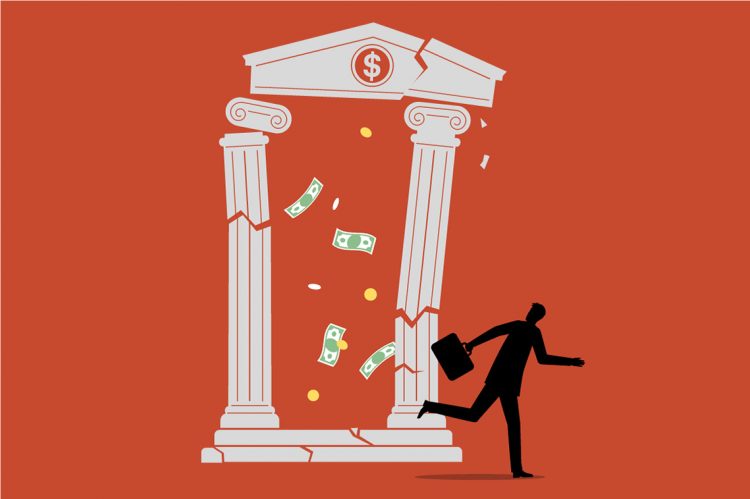Headlines about crumbling banks and financial institutions are stirring up concerns again.
Many are still reeling from the news that California regulators shuttered startup-focused lender Silicon Valley Bank (SVB). Amid the calamity that manifested days ago, several onlookers and pundits within the real estate industry are contemplating how recent events surrounding the declining fortunes of SVB and other banks could impact the housing market.
“The collapse of Silicon Valley Bank and Signature Bank has introduced a whole new level of uncertainty into the economy and could change the trajectory of the Federal Reserve’s actions, at least in the near term,” said Bright MLS Chief Economist Dr. Lisa Sturtevant in a recent commentary.
The Fed has focused on reeling in inflation with its interest rate hike efforts since March 2022, fueled by a resilient labor market, according to Sturtevant. However, she noted that recent bank failures and uncertainty in the financial sector have left Fed officials in a pickle as they must now decide between price stability and economic stability.
“The two banks that have failed were highly concentrated in the tech sector and cryptocurrency. Banks with more diverse portfolios are less exposed to the risks these two particular banks faced,” Sturtevant said. “However, because of the size of the banks that failed, and the growing awareness of how the fast-rising interest rates are impacting the financial system, it is possible the Fed could shift course.”
How the Fed will respond when it meets next week is still being determined.
However, Sturtevant acknowledged growing sentiments that they would ease up on interest rate increases either by pausing rate hikes altogether this month or adopting a quarter-point increase instead of the half-point increase that had been expected.
“If the Fed does dial back on planned rate increases, it will be a signal that they see weakness in the financial sector and the broader economy beyond just SVB and Signature Bank,” she said. “Investors will then be looking for safer investments, such as U.S. Treasuries and mortgage-backed securities, which could ultimately lead to lower mortgage rates.”
That economic uncertainty creates an opportunity for would-be homebuyers and existing homeowners looking to refi as mortgage rates could come down.
That said, it could also open the door to a potential boon amid the banking bust for the proactive real estate professional, according to Anthony Lamacchia, broker/owner/CEO of Lamacchia Realty Inc.
“It’s been an interesting week for financial markets,” Lamacchia said in a social media post over the weekend, where he stressed the potential opportunity for agents after mortgage rates dropped a quarter point on Friday.
“You have to find the good side when you see something wrong in the system instead of just being the average person and completely freaking out,” Lamacchia said in the video.
Lamacchia elaborated further on his point in a recent interview with RISMedia where he stressed the importance of agents getting back in touch with buyers as mortgage rates decline.
“Will that be sustainable?” he asks. “That remains to be seen, but a buyer that strikes over the next seven days will be a buyer that pays a lower interest rate than they would’ve in the last seven before last Thursday.”
Lamacchia isn’t the only one to see a potential boon in SVB’s bust.
Reba Miller, senior executive associate broker at Compass, agrees that there is an opportunity for buyers to win amid this chaotic season, but that’s only if they can afford to buy at this time.
In the New York market, where she operates, Miller notes that more affluent buyers will be able to capitalize on the recent dips in mortgage rates. However, affordability challenges are still an issue for many consumers.
“The interest rate doesn’t have a big impact on those that are extremely wealthy,” she says. “The impact is for those buying the first-time home or stepping up a little bit from the first home and buying the second home, and then they had theirs to sell, so they had to take less on.”
For agents with clients better positioned with the rate dip of the past couple of days, Miller notes that “good brokering” will be vital to agents as they reinstill confidence in their buyers to step back into the market.
Naturally, headlines of collapsing financial institutions are likely to stir up fears in consumers—especially if they remember 2008—but Kendall Bonner, team leader of the Kendall Bonner Team with eXp Realty, looks at SVB’s fall as more of a “cautionary tale,” rather than a repeat of the Great Recession.
Instead, she tells RISMedia that perspective is critical when agents work with their clients.
“We should see it as an opportunity for agents who focus on skill sets, tool sets and mindsets,” she says. “It’s going to be more important than ever because consumers are going to be confused by this, and we need to be there to educate them.”
That includes taking advantage of the mortgage rate situation, Bonner adds. As head of a 17-agent team, Bonner notes that brokers and team leads should also urge agents to help their clients focus on the facts of the market rather than fears stirred up by headlines and social media.
“Fears are based on things that we cannot control, and there are going to be risks associated with investing, whether you invest in real estate or stocks, bonds, etc.,” she says. “When thinking about real estate investment, I think it’s super important to continue to monitor the facts on the ground because every real estate market is still local.
“Even though a collapse like this has this potential ripple effect on other financial institutions in the industry, consumers need guidance more than ever on their personal situations,” Bonner continues, stressing the importance of agents staying in the know about what is happening in their markets, and educated on how to address changes.
Operating in the Silicon Valley market, with many clients entrenched in the tech sector, California-based Broker Associate Billy McNair of Coldwell Banker Global Luxury says he’s had to juggle a mix of nervousness and apprehension following SVB’s collapse.
“Naturally, when there’s uncertainty in the financial markets that can then impact the real estate market, certainly here in Silicon Valley, it can impact it in a couple of different ways,” he says. “It would seem that certain buyers may hit the pause button or pull back on major purchases until they feel like they have more certainty in the financial markets.
“But we’ve also seen times in the Silicon Valley real estate market where this is something that has people moving money into real estate because of uncertainty in the financial markets or concerns about having cash in the banking industry,” McNair continues. “I see a lot of clients do that for diversification purposes or are oftentimes moving money into real estate because, again, it’s an asset you can touch, you can hold, you can live in it. “
While many sat in wait for potential ripple effects to reverberate among regional banks, McNair tells RISMedia that government intervention over the weekend helped alleviate some of the concerns.
Despite the banking turmoil that started with SVB and subsequently hit New York-based Signature Bank, the FDIC stepped in to take control of both institutions. At the same time, the federal government assured folks that all depositors of the defunct banks would be made whole, according to a joint statement from the U.S. Treasury Department and other bank regulators.
“That obviously is a huge measure that helps some of that nervousness,” McNair says.
Though he thinks the cooling effect of SVB and Signature’s collapse in the mortgage environment is a potential boon for buyers, McNair also thinks inventory constraints and seller sentiment pose a persisting hurdle in the market.
“There are many sellers out there that are now reluctant to sell and don’t want to sell their house because they don’t want to give up the 2.5%, 3% or 3.5% interest rate they locked in either during their purchase in the last few years or in the refinance environment,” he says.
According to Goldman Sachs data reported by Yahoo Finance, 99% of borrowers have a mortgage rate lower than 6%, or the current market rate, and around 28% of those have rates below 3%.
“That’s keeping the inventory quite low, and as a result, it’s still a pretty balanced market,” McNair says. “I certainly would not characterize this as a buyer-favorable market at the moment.
“In an environment like this where in light of the news of the last several days, some segment of buyers are gonna be nervous, they’re gonna pull back,” McNair continues. “If you’re a buyer willing to have the gumption to stay with it and make a purchase…then you absolutely can see an opportunity where maybe you’re going to get that house with less competition than you would have a week or two weeks ago.”












